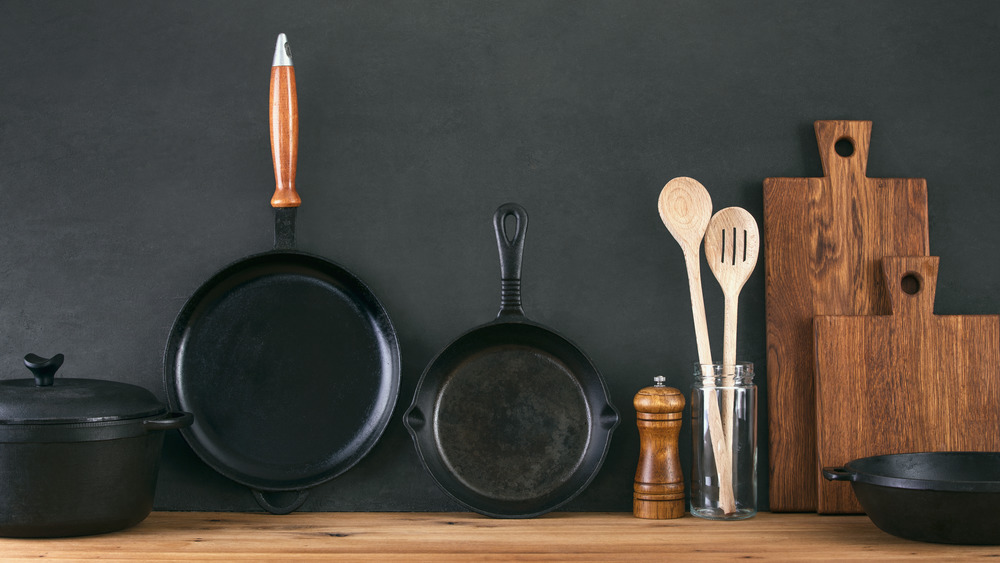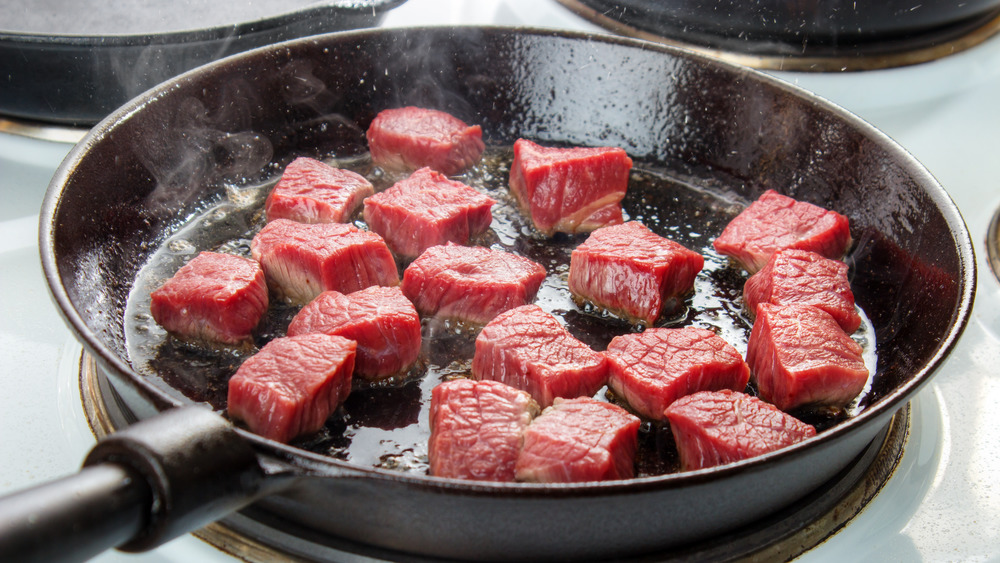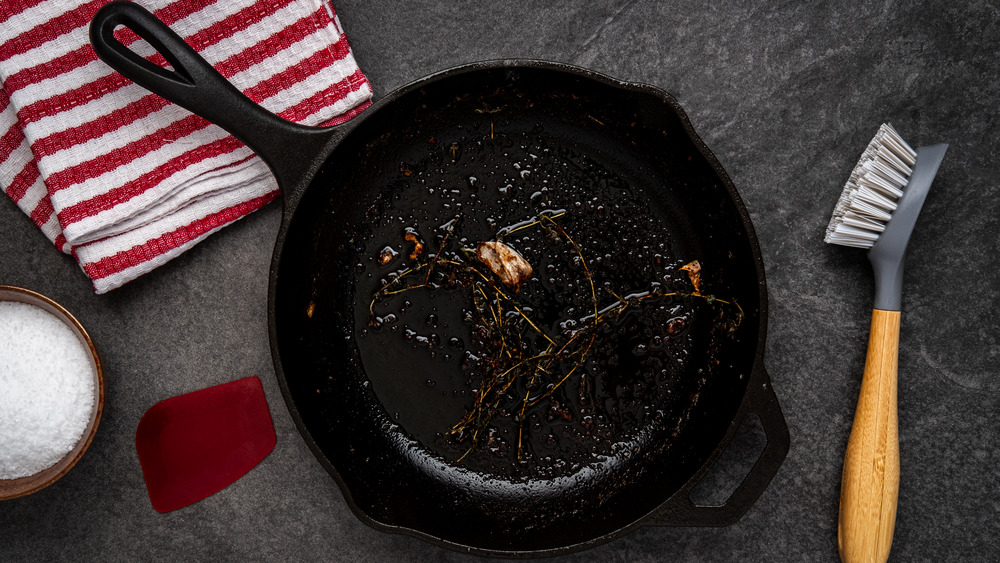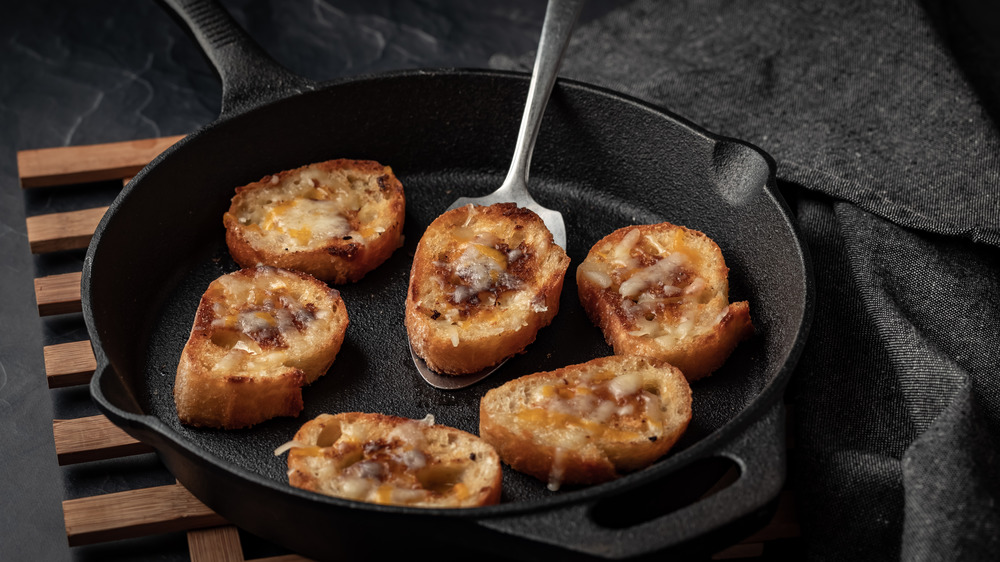Myths About Cast Iron Skillets You Need To Stop Believing
If you are the proud owner of a cast iron skillet, then you might have lent belief to some of the biggest misconceptions and myths about the pan out there. Though there are widespread misunderstandings about cast iron, you should feel some relief once you know how much easier it can be to care for the metal. Cast iron is actually very low-maintenance once you know how to properly care for it, and it's very durable (via Serious Eats). If properly cared for, there's no need to worry about anything going awry with the seasoning.
There's an idea floating around the cast iron community that the pans are delicate, but there are some that have stuck around through generations. According to Today, J. Kenji López-Alt, the author of The Food Lab, said, "go to an antique store, and you'll see cast-iron pans that are 100 years old. It's not a delicate flower but rather as tough of a material as you can get." López-Alt explained that the only ways you can go wrong with your beloved pan are if you don't re-season it or if you pour tons of water into it when it is really hot.
The biggest myth is about its conductivity
The biggest myth around cast iron skillets is that they heat evenly. Per Today, this is far from true, though. This means that the pan will not heat up to the same degree across the entire surface at the same time. Instead, cast iron skillets can be hot in one place and cooler in another as they heat up. But, once they have had roughly 10 minutes to completely heat the entire skillet, the pan will retain its heat very well and radiate it. Just remember to turn it every so often as the skillet heats so the entire pan does get hot.
What is really great about cast iron skillets is that once they are hot, they can cook very evenly. This is an important component of getting a perfect sear on meat, as Serious Eats says. Though it takes a little while longer to get the entire pan hot, it is well worth the extra time in terms of your completed dish. Chances are you'll be thankful for the cooking power of cast iron once you dig in.
You can wash your cast iron with soap
Another misconception people hold is that cast iron skillets cannot be washed with dish soap (via Lodge Cast Iron). Though dish soap is made to strip oil, it cannot remove the skillet's seasoning because the seasoning itself is not just a coating of oil, according to Serious Eats. You build up a skillet's seasoning by pouring a small amount of oil into the hot pan and smoothing it over the surface with a paper towel. By heating the pan as you smear the oil, the oil cooks onto the pan and chemically attaches itself to the metal. While you can't soak the skillet in soapy water, using a bit of dish soap and warm water to clean your pan will not remove the seasoning.
After your skillet has been cleaned, you should re-season it, too. It's another falsehood that pre-seasoned pans don't have to ever be seasoned again, according to Lodge Cast Iron. To do so, you can place the skillet on a burner set to the highest heat to let the remaining water evaporate, according to Serious Eats. After the skillet is dry, just add and spread your oil. When it smokes, smear it around again and remove it from the heat to cool.
You can use metal on cast iron too
One final myth to keep in mind is that you cannot use metal utensils to cook and handle the food you have in your cast iron skillet, pan, or pot. The truth of the matter is that it is perfectly safe to use metal spatulas, spoons, and more. This idea goes back to the concept of the seasoning and metal being dainty. López-Alt says your pan can take the "tiny nudges" and "dings from metal utensils." Though, he explains that you primarily want to avoid "deliberately scraping at the pan itself."
Serious Eats explains that any black bits you might see falling from the bottom of the pan are most likely carbonized food that was leftover rather than the seasoning itself. Apparently, to get the seasoning to peel up, you need to heat and dry the pan over and over for about a month without re-seasoning it.
As long as you are taking moderately good care of your cast iron by washing and drying it and re-seasoning it, you can likely disregard most myths that you're concerned about.



